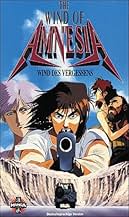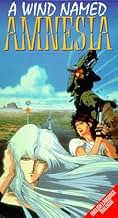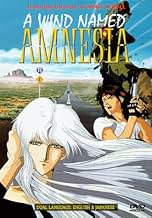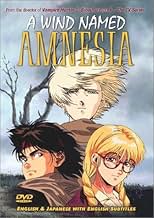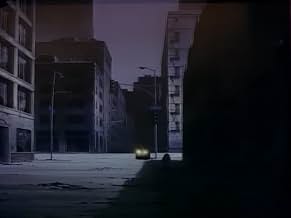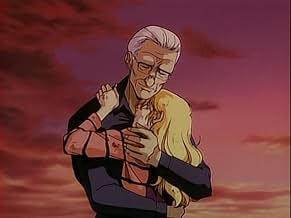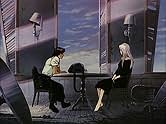Kaze no na wa amunejia
- Vidéo
- 1990
- Tous publics
- 1h 20min
NOTE IMDb
6,5/10
1,6 k
MA NOTE
Ajouter une intrigue dans votre langueAfter a mysterious gust of wind erases all human knowledge, a rehabilitated young man and an enigmatic woman travel across a ravaged America in search of others like them.After a mysterious gust of wind erases all human knowledge, a rehabilitated young man and an enigmatic woman travel across a ravaged America in search of others like them.After a mysterious gust of wind erases all human knowledge, a rehabilitated young man and an enigmatic woman travel across a ravaged America in search of others like them.
Kazuki Yao
- Wataru
- (voix)
Keiko Toda
- Sophia
- (voix)
Osamu Saka
- Simpson
- (voix)
Noriko Hidaka
- Lisa
- (voix)
Kappei Yamaguchi
- Johnny
- (voix)
Daisuke Gôri
- Little John
- (voix)
Masaharu Satô
- Guardian
- (voix)
Hirohiko Kakegawa
- Priest
- (voix)
Histoire
Le saviez-vous
- ConnexionsFeatured in Anime Abandon: A Wind Named Amnesia (2013)
- Bandes originalesTrue Love
Lyrics by Kaoru Asagi
Composed by Takashi Tsushimi
Arranged by Motoki Funayama
Performed by Akemi and Takashi Tsushimi
Commentaire à la une
Narratives about the journey, to which undoubtedly belongs the film-journey "The Wind Called Amnesia", in European and world art, as a rule, carry a symbolic meaning, often being philosophical parables. "Amnesia" also claims to hold symbolic meaning. The author of the story, Kikuchi Hideyuki, borrowed the idea from the American science fiction novel of the 1930s "Rebirth" by Thomas McClary and endowed there Japanese protagonist as well as some of his own ideas. Even the names are symbolic in this anime, as well as encounters during the journey and some narrative elements that Kikuchi Hideyuki later used in his other works.
The plot of the anime is rather ominous - a mysterious wind swept over the earth and took with it all the memory of mankind. This wind was so weird that it caused not only amnesia, but also deprived people of the verbal-logical, emotional and even motor memory responsible for the interaction and control of the mechanisms created by people. In a strange way it did not deprive peopleof of that part of the motor memory which is responsible for the ability to walk or to use clothes. In general, the wind named Amnesia clearly was not a simpleton and had something specifically against the achievements of human civilization, including the ability to speak. One such memoryless person is the as-yet-unnamed anime protagonist, wandering aimlessly through post-apocalyptic America. In the process of his wanderings, our hero meets a boy Johnny, incapacitated teenager who has not lost his memory and the ability to speak. As it turned out, as a result of the experiment, Johnny's brain functioned like a computer, and therefore the wind named Amnesia did not affect Johnny's memory. With the help of a learning machine, Johnny returns to the protagonist the ability to speak and the memory of human civilization, and then teaches him to drive a car (it is not clear, however, how a thirteen-year-old boy unable to walk acquired this skill himself and passed it on to the main character), shoot a pistol, "read" stars, find edible plants and other skills necessary for survival in the post-apocalyptic world. Johnny also identified the protagonist as a Japanese, gave him the name "Wataru", which can be translated as a wanderer or a vagabond, and deceived Wataru about his age. Since Johnny was a "remnant" of human civilization, which means that he was subject to "oblivion", having completed his small educational mission, he shares the fate of civilization - he dies. But before his death, he gives Wataru instruction, saying that humanity is now reduced to its true self and that Wataru has the duty to investigate this human essence in its purest form and revive humanity.
Thus begins the journey of Wataru - riding his Jeep, Wataru ends up in San Francisco, where he encounters a police robot, the operator of which has long been dead, but the machine is still wandering around the city with a skeleton in the cockpit, demanding submission from people and killing them. The mysterious white-haired beauty Sophia helps Wataru to defeat the robot using telepathy to point out the weak point of the machine. Sophia is not only beautiful, but also knows how to speak, knows what she should not know, has the ability to telepathy and looks at the world in a detached and judicious way. The name Sophia is translated from Greek as "wisdom", which is also an attribute of God in Christianity and even an independent "deity" in Gnosticism. Philosophical journey is indispensable without wisdom. Therefore, having united with Wisdom, that is, with Sophia, the Wanderer (Wataru) continues his journey in order to understand humanity.
Throughout the film, one and the same idea can be traced, repeated in different "meetings" experienced by Wataru and Sofia on their journey - the hero and people in general are opposed by the achievements of human civilization, the creations of man, who have turned into oppressors of their creators. This is a police robot that demands obedience from people and kills them, a giant excavator that sacrifices people, a supercomputer that enslaves people and turns them into their weak-willed puppets. It is the "suppression and exploitation" by the civilization of the people who created it that allegedly serves as the reason that the aliens decided to "save humanity" by depriving it of memory.
Such ideas about civilization as an evil that suppresses humanity are old and uncomplicated. Of course, we are not talking about some kind of "evil / good" aliens who are supposed to "save" humanity, relieving it from the "burden" of civilization. It's about the people themselves. It was not in vain that I quoted lines from the Internationale above. There was once such a utopian socialist Léger-Marie Deschamps, who wrote that "the state of laws for us, people in a civil state, is undeniably worse than in a state of savagery ... Evil in a person takes place only thanks to the existing civil state, which infinitely contrary to his nature. There was no such evil in man in the herd state." In order to get rid of the evils of civilization and bring people to a "blissful state", according to Deschamps, not only the fine arts - poetry, painting or architecture, but also science and technology, literacy and writing, must disappear, all books must be burned, and man must be brought down to the state of livestock (after all, you can't argue that a cow peacefully chewing grass on the lawn, not knowing its fate, is happier in its own way than a person burdened with many worries and fears?).
Deschamps is echoed by the pervert old man Freud, who built his concept of the layers of the human psyche by analogy with the Maxist theory of the division and oppression of some social classes by others. He argued that layers of the psyche created under the influence of civilization suppress and exploit the "wild" layer of the psyche, which boils down to sexuality and the "principle of pleasure", and thus civilization deprives humanity of "happiness". Apparently, that's why Sophia "gives" Wataru, who has abandoned civilization, sex with her, as "the highest gift of mankind." To the music of Bach and with the background depicting Madonna with the baby Jesus, Wataru sucks the nipples of naked Sophia. Apparently, in such a simple way, imbibing "wisdom" from her breasts. This is how our Wanderer "fell in love" with Wisdom (Sophia), that is, he literally became philo (to love)-sopher (wisdom), a Wisdom Lover. And the task of the philosopher, as you know, is "anamnanesis" - the return to people of the wisdom they have forgotten, which is what our newborn Wisdom Lover is called to do. The background on which the copulation takes place, depicting the Madonna with the Christ child, apparently also should symbolize that the new "Virgin Mary" (Sophia) gives birth to the one who is called to renew humanity (Wataru). Kikuchi Hideyuki later develops this "theme" in the "Wicked City", where the culmination is the copulation of the heroes in the church, under the statue of the Virgin Mary. Just as in "Amnesia", a man here copulates with a non-human woman (a demoness), and their child is called to "save the world." At the same time, there Kikuchi goes even further, opposing the new "Madonna" - the demoness to the Virgin Mary. If Mary is immaculate, then the demoness is the embodiment of depravity - in the course of the plot, she is raped by everyone except by the lazy, and in the most perverted ways. And judging by what was shown she did enjoy it. It is from the statue of the Virgin Mary, declared an "enemy" by the old man, that a monster breaks out, attacking the protagonists. Well, the child of the demon, according to Christianity, is the Antichrist - so the viewer should not be misled by the Christian symbolism depicted in both cases - it is here desacralized and abolished with all the socialist passion of theomachism, with the proposal of new images of "salvation of mankind". The socialist ideas of Deschamps, Marx and Freud develop within the framework of neo-Freudianism and neo-Marxism. Marcuse, for example, proposes the "liberation" of the libido by getting rid of the control of the "repressive mind" and the destruction of social institutions. In contemporary art, these ideas are expressed in the fight against "repressive" and "suffocating" culture by creating anti-aesthetic things, images of garbage and excrement, designed to overcome the "discrimination" of the disgusting, liberation of the "suppressed instincts." And in "Amnesia" we have computers and machines that oppress and enslave humanity.
In general, it is not the insidious aliens that should be feared, but the representatives of humanity prone to nihilism. Well, the anime itself should be renamed "The Wind Called Nihilism". In addition to the primitive ideological content, "Amnesia" is also a rather long and boring anime. Pleasant except that the drawing of the "old school" of the 1980s and the musical accompaniment. And for once, the Japanese decently portrayed the young woman's breasts (Sofia), which in itself is close to uniqueness. The narrative itself, as noted above, is rather lengthy, but fans of road movies and parable films may find it meditative. And the very attempt to make anime filled with meaning (not simply imitating it), albeit with controversial, if not insane ideas, is a rather rare phenomenon now. So with all the caveats, Amnesia deserves an above-average rating.
The plot of the anime is rather ominous - a mysterious wind swept over the earth and took with it all the memory of mankind. This wind was so weird that it caused not only amnesia, but also deprived people of the verbal-logical, emotional and even motor memory responsible for the interaction and control of the mechanisms created by people. In a strange way it did not deprive peopleof of that part of the motor memory which is responsible for the ability to walk or to use clothes. In general, the wind named Amnesia clearly was not a simpleton and had something specifically against the achievements of human civilization, including the ability to speak. One such memoryless person is the as-yet-unnamed anime protagonist, wandering aimlessly through post-apocalyptic America. In the process of his wanderings, our hero meets a boy Johnny, incapacitated teenager who has not lost his memory and the ability to speak. As it turned out, as a result of the experiment, Johnny's brain functioned like a computer, and therefore the wind named Amnesia did not affect Johnny's memory. With the help of a learning machine, Johnny returns to the protagonist the ability to speak and the memory of human civilization, and then teaches him to drive a car (it is not clear, however, how a thirteen-year-old boy unable to walk acquired this skill himself and passed it on to the main character), shoot a pistol, "read" stars, find edible plants and other skills necessary for survival in the post-apocalyptic world. Johnny also identified the protagonist as a Japanese, gave him the name "Wataru", which can be translated as a wanderer or a vagabond, and deceived Wataru about his age. Since Johnny was a "remnant" of human civilization, which means that he was subject to "oblivion", having completed his small educational mission, he shares the fate of civilization - he dies. But before his death, he gives Wataru instruction, saying that humanity is now reduced to its true self and that Wataru has the duty to investigate this human essence in its purest form and revive humanity.
Thus begins the journey of Wataru - riding his Jeep, Wataru ends up in San Francisco, where he encounters a police robot, the operator of which has long been dead, but the machine is still wandering around the city with a skeleton in the cockpit, demanding submission from people and killing them. The mysterious white-haired beauty Sophia helps Wataru to defeat the robot using telepathy to point out the weak point of the machine. Sophia is not only beautiful, but also knows how to speak, knows what she should not know, has the ability to telepathy and looks at the world in a detached and judicious way. The name Sophia is translated from Greek as "wisdom", which is also an attribute of God in Christianity and even an independent "deity" in Gnosticism. Philosophical journey is indispensable without wisdom. Therefore, having united with Wisdom, that is, with Sophia, the Wanderer (Wataru) continues his journey in order to understand humanity.
Throughout the film, one and the same idea can be traced, repeated in different "meetings" experienced by Wataru and Sofia on their journey - the hero and people in general are opposed by the achievements of human civilization, the creations of man, who have turned into oppressors of their creators. This is a police robot that demands obedience from people and kills them, a giant excavator that sacrifices people, a supercomputer that enslaves people and turns them into their weak-willed puppets. It is the "suppression and exploitation" by the civilization of the people who created it that allegedly serves as the reason that the aliens decided to "save humanity" by depriving it of memory.
Such ideas about civilization as an evil that suppresses humanity are old and uncomplicated. Of course, we are not talking about some kind of "evil / good" aliens who are supposed to "save" humanity, relieving it from the "burden" of civilization. It's about the people themselves. It was not in vain that I quoted lines from the Internationale above. There was once such a utopian socialist Léger-Marie Deschamps, who wrote that "the state of laws for us, people in a civil state, is undeniably worse than in a state of savagery ... Evil in a person takes place only thanks to the existing civil state, which infinitely contrary to his nature. There was no such evil in man in the herd state." In order to get rid of the evils of civilization and bring people to a "blissful state", according to Deschamps, not only the fine arts - poetry, painting or architecture, but also science and technology, literacy and writing, must disappear, all books must be burned, and man must be brought down to the state of livestock (after all, you can't argue that a cow peacefully chewing grass on the lawn, not knowing its fate, is happier in its own way than a person burdened with many worries and fears?).
Deschamps is echoed by the pervert old man Freud, who built his concept of the layers of the human psyche by analogy with the Maxist theory of the division and oppression of some social classes by others. He argued that layers of the psyche created under the influence of civilization suppress and exploit the "wild" layer of the psyche, which boils down to sexuality and the "principle of pleasure", and thus civilization deprives humanity of "happiness". Apparently, that's why Sophia "gives" Wataru, who has abandoned civilization, sex with her, as "the highest gift of mankind." To the music of Bach and with the background depicting Madonna with the baby Jesus, Wataru sucks the nipples of naked Sophia. Apparently, in such a simple way, imbibing "wisdom" from her breasts. This is how our Wanderer "fell in love" with Wisdom (Sophia), that is, he literally became philo (to love)-sopher (wisdom), a Wisdom Lover. And the task of the philosopher, as you know, is "anamnanesis" - the return to people of the wisdom they have forgotten, which is what our newborn Wisdom Lover is called to do. The background on which the copulation takes place, depicting the Madonna with the Christ child, apparently also should symbolize that the new "Virgin Mary" (Sophia) gives birth to the one who is called to renew humanity (Wataru). Kikuchi Hideyuki later develops this "theme" in the "Wicked City", where the culmination is the copulation of the heroes in the church, under the statue of the Virgin Mary. Just as in "Amnesia", a man here copulates with a non-human woman (a demoness), and their child is called to "save the world." At the same time, there Kikuchi goes even further, opposing the new "Madonna" - the demoness to the Virgin Mary. If Mary is immaculate, then the demoness is the embodiment of depravity - in the course of the plot, she is raped by everyone except by the lazy, and in the most perverted ways. And judging by what was shown she did enjoy it. It is from the statue of the Virgin Mary, declared an "enemy" by the old man, that a monster breaks out, attacking the protagonists. Well, the child of the demon, according to Christianity, is the Antichrist - so the viewer should not be misled by the Christian symbolism depicted in both cases - it is here desacralized and abolished with all the socialist passion of theomachism, with the proposal of new images of "salvation of mankind". The socialist ideas of Deschamps, Marx and Freud develop within the framework of neo-Freudianism and neo-Marxism. Marcuse, for example, proposes the "liberation" of the libido by getting rid of the control of the "repressive mind" and the destruction of social institutions. In contemporary art, these ideas are expressed in the fight against "repressive" and "suffocating" culture by creating anti-aesthetic things, images of garbage and excrement, designed to overcome the "discrimination" of the disgusting, liberation of the "suppressed instincts." And in "Amnesia" we have computers and machines that oppress and enslave humanity.
In general, it is not the insidious aliens that should be feared, but the representatives of humanity prone to nihilism. Well, the anime itself should be renamed "The Wind Called Nihilism". In addition to the primitive ideological content, "Amnesia" is also a rather long and boring anime. Pleasant except that the drawing of the "old school" of the 1980s and the musical accompaniment. And for once, the Japanese decently portrayed the young woman's breasts (Sofia), which in itself is close to uniqueness. The narrative itself, as noted above, is rather lengthy, but fans of road movies and parable films may find it meditative. And the very attempt to make anime filled with meaning (not simply imitating it), albeit with controversial, if not insane ideas, is a rather rare phenomenon now. So with all the caveats, Amnesia deserves an above-average rating.
- smoothrunner
- 29 mai 2023
- Permalien
Meilleurs choix
Connectez-vous pour évaluer et suivre la liste de favoris afin de recevoir des recommandations personnalisées
Détails
Contribuer à cette page
Suggérer une modification ou ajouter du contenu manquant

